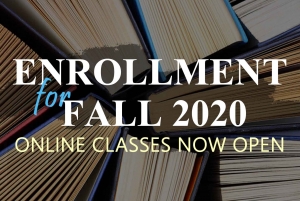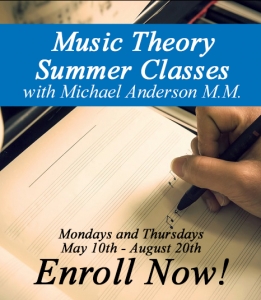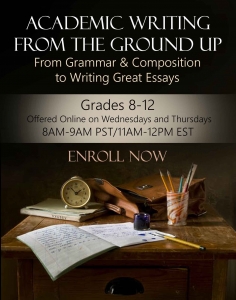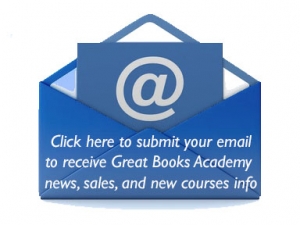“We are tied down, all our days and for the greater part of our day, to the commonplace. That is where contact with the great thinkers, great literature helps. In their company we are still in the ordinary world, but it is the ordinary world transfigured and seen through the eyes of wisdom and genius. And some of their genius becomes ours. . .” – Mortimer J. Adler
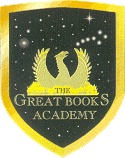 The Great Books Academy (GBA) is a homeschool and charter school organization dedicated to liberal education based on the classic great books of Western Civilization. Liberal education, based on the Liberal Arts, takes its name from the Latin word liber , meaning free. This dedication to liberal education is borne of the understanding that it is liberal education, traditionally understood, that leads men to freedom and happiness. Hand in hand with this understanding of liberal education is the acknowledgement that freedom and happiness do not mean license and pleasure. Rather, freedom and happiness are found in the life of virtue. The GBA has been inspired by the educational initiatives of Dr. Mortimer J. Adler, who sees in classical liberal education not only the means necessary to imbue students with the skills to become excellent life-long learners, but also the means to be fully engaged citizens, exercising civic duties from a principled understanding of the issues which confront them daily. These too are all qualities shared by free and happy men.
The Great Books Academy (GBA) is a homeschool and charter school organization dedicated to liberal education based on the classic great books of Western Civilization. Liberal education, based on the Liberal Arts, takes its name from the Latin word liber , meaning free. This dedication to liberal education is borne of the understanding that it is liberal education, traditionally understood, that leads men to freedom and happiness. Hand in hand with this understanding of liberal education is the acknowledgement that freedom and happiness do not mean license and pleasure. Rather, freedom and happiness are found in the life of virtue. The GBA has been inspired by the educational initiatives of Dr. Mortimer J. Adler, who sees in classical liberal education not only the means necessary to imbue students with the skills to become excellent life-long learners, but also the means to be fully engaged citizens, exercising civic duties from a principled understanding of the issues which confront them daily. These too are all qualities shared by free and happy men.
“If you think education is expensive, try ignorance” – Max Weismann, Chair of the Great Books Academy
We owe a great debt to Dr. Adler for devoting most of his life to developing, editing, promoting, sustaining and perfecting the Great Books educational reform movement. He has done this from 1921 to the present day. Several of our directors were present at a Socratic Discussion seminar presided over by Dr. Adler as recently as May, 2000. Besides editing the 60 volume Britannica Great Books set (last revised by Dr. Adler in 1990), he has published over 50 books on philosophy and education, including the Great Ideas , which are those ideas contained within the Great Books that make them worth reading and rereading (for example: beauty, truth, goodness). Our Chairman, Max Weismann, co-founded (with Dr. Adler) the Center for the Study of the Great Ideas, in Chicago, which is still promoting this study.
In addition to the great debt owed to Dr. Adler, the GBA unabashedly credits St. John’s College (Annapolis, MD and Sante Fe, NM) and the Pearson Integrated Humanities Program (no longer extant) at Kansas University as the models upon which its curricula are based. Working from these models, the GBA maintains that a genuine liberal education requires a study of the greatest books in the Western tradition, ordered not only in its method, but also toward realizing human happiness and wisdom. These books are the discussion throughout the history of Western Civilization regarding all the aspects of men’s souls, science, and experiences. This discussion has taken place within the written works of writers such as Plato and Aristotle, Augustine and Aquinas, Galileo and Newton. Based on statements and responses, proposals and contradictions, these works are an ordered discussion which spans three millennia. They examine man’s relation to himself, his community, his world, and his Creator. To take the time to listen to this discussion by reading these great works, one cannot help but be led to greater appreciation, greater wonder, and greater understanding of what it means to be human.
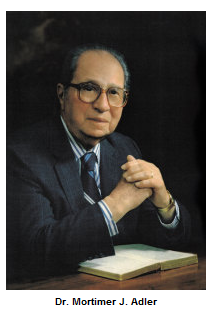 The great books which have formed men, communities, and even nations, have done so in different forms. Whether that form is the philosophy of Aristotle, the poetry of Shakespeare, or the politics of Rousseau, readers are continually challenged to grasp, evaluate, and judge works of great depth and complexity. Yes, these works are often hard to read. Yet, just as a blade is sharpened on a hard stone, so too are intellects sharpened on hard books. The result is the ability to cut through the noise and confusion found in the world, and see in its place order and understanding. However, if one only reads these works, one is participating in a one-sided conversation.
The great books which have formed men, communities, and even nations, have done so in different forms. Whether that form is the philosophy of Aristotle, the poetry of Shakespeare, or the politics of Rousseau, readers are continually challenged to grasp, evaluate, and judge works of great depth and complexity. Yes, these works are often hard to read. Yet, just as a blade is sharpened on a hard stone, so too are intellects sharpened on hard books. The result is the ability to cut through the noise and confusion found in the world, and see in its place order and understanding. However, if one only reads these works, one is participating in a one-sided conversation.
Calling the body of work known as the great books a “conversation” is obviously not entirely metaphorical. There is indeed a written conversation within these books. Yet, it is the very real verbal conversation regarding these works, that takes place between students today, that advances the knowledge and understanding of our students, our community, and our culture. As with most lofty and profound matters, the Great Ideas are understood best in discussions and disputations. It was Professor John Erskine who initiated the Socratic (questioning) discussion group manner of delving into the contents of the great books discussing a given text, usually read beforehand, among 15 to 25 students in round-table seminar format with a moderator, rather than listening to lectures. The participants profited enormously from this approach (made famous by Socrates and Plato), and thus in this country was reborn the Socratic method of learning. Likewise, St. John’s College conducts discussion groups as the primary means for learning. The GBA follows these leads with its own optional discussion groups, being the first homeschool organization to do so, using the Internet and other means.
GBA has a fully developed homeschool elementary curriculum for grades nursery through 8th, selected eclectically for the very finest materials available from numerous publishers. This conventional curriculum is organized for easy viewing at the Great Books Store by grade level or by subject ( eg. math, history).
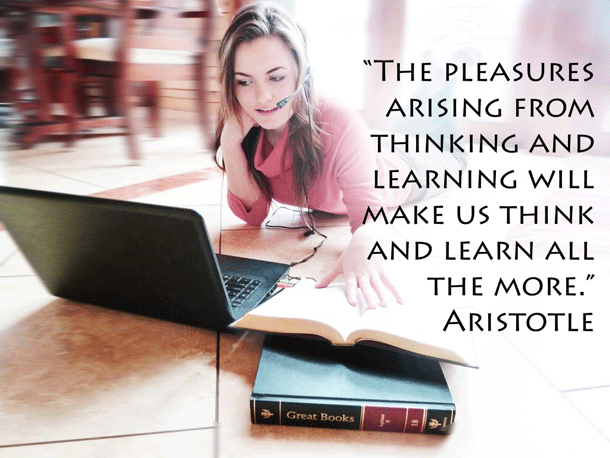 HOMESCHOOLING & INDEPENDENT HOME STUDY. After the millennial tradition of homeschooling prior to the mid-1800’s it remained the favored educational method for families of diplomats, military and mariners, often on the move or in remote locales, through the 1970s. The widespread publicity given to academic and disciplinary problems in public schools beginning in the 1980’s prompted a groundswell of parental demand for homeschooling curricula. Skyrocketing school violence and drug use in the 1990’s greatly increased the number of homeschooled students. Estimates place the number of homeschooled students in the U.S. at over 2 million, and growing by a phenomenal 15% per year. Study after study has concluded that homeschooled students outperform publicly-schooled students by wide margins, in every academic category, and even in “socialization” skills. In the early 1990’s homeschooling was often selected by parents reacting negatively to problems in the public schools and in society at large. Beyond the absence of the problems associated with public schooling, little was expected of homeschool curricula except the elementary basics – the 3 R’ s. But as the movement has grown and become mainstream, more parents are searching for better curricula for their children. Increasingly, parents are asking what the goals of education are, and what are the best means of attaining those goals. In our view, this is an inevitable and entirely positive shift in the homeschooling movement. It is the growing movement towards the approach that addressed and answered those questions in the past – classical education. It is noteworthy that classical, Athenian education (“paideia”) began with seven years of homeschooling.
HOMESCHOOLING & INDEPENDENT HOME STUDY. After the millennial tradition of homeschooling prior to the mid-1800’s it remained the favored educational method for families of diplomats, military and mariners, often on the move or in remote locales, through the 1970s. The widespread publicity given to academic and disciplinary problems in public schools beginning in the 1980’s prompted a groundswell of parental demand for homeschooling curricula. Skyrocketing school violence and drug use in the 1990’s greatly increased the number of homeschooled students. Estimates place the number of homeschooled students in the U.S. at over 2 million, and growing by a phenomenal 15% per year. Study after study has concluded that homeschooled students outperform publicly-schooled students by wide margins, in every academic category, and even in “socialization” skills. In the early 1990’s homeschooling was often selected by parents reacting negatively to problems in the public schools and in society at large. Beyond the absence of the problems associated with public schooling, little was expected of homeschool curricula except the elementary basics – the 3 R’ s. But as the movement has grown and become mainstream, more parents are searching for better curricula for their children. Increasingly, parents are asking what the goals of education are, and what are the best means of attaining those goals. In our view, this is an inevitable and entirely positive shift in the homeschooling movement. It is the growing movement towards the approach that addressed and answered those questions in the past – classical education. It is noteworthy that classical, Athenian education (“paideia”) began with seven years of homeschooling.
CHARTER SCHOOLS. A growing number of charter and cyber-charter schools in various states now carry or can order our curriculum for independent study students at home. Many will add it upon request. This allows you to obtain state reimbursement for our materials, lesson plans, and the optional, online Great Books Discussion class fee. Call local charter schools or us for details.
THE GREAT BOOKS ACADEMY DIFFERENCE. Eleven important elements were brought together to complete our curriculum: (1.) Classical education – elements of items 2,3,4, 6 and 7, described below, make our program distinctly classical in approach; (2.) the “Good Books” – the great children’s classics, selected by the famed classicist, the late Dr. John Senior, which are read in our nursery-8th grade literature program prepare our students for the greatest works of our culture; (3.) the Great Books – the greatest classics of Western civilization, beginning with the ancient Greeks and Romans, which are studied in our 9th-12th grade literature program; (4.) Great Books Discussion class online – these optional, online groups develop thinking, speaking, listening and reading skills while acquainting our students with the great ideas contained in the classics; (5.) the finest materials available – since we did not write the classics we are able to select from the finest illustrated editions and most up-to-date texts available in other subjects from many sources, without having to restrict our selections to our own materials; (6.) our “poetic” and integrated approach to education of the senses, imagination and intuition via the use of the natural wonder and love of the beauty of nature in young students, which was developed for older students into the Integrated Humanities Program by Drs. Quinn, Senior and Nelick (see articles on this in Classical Homeschooling Magazine issue #2); (7.) our liberal arts and generalist educational approach (from “libertas” meaning liberty or freedom from ignorance – not “liberalism” as a political view) is preparatory not merely for college, but also for life; it is not the narrow specialization or vocationalism that prepares young people for only one job, skill or specialty so often obsolete in ten years, or even less in our day; (8.) designed for homeschooling and independent home study programs (offered through many charter schools with state reimbursement for some or all costs), with all the attendant advantages which numerous studies have demonstrated homeschooling has over public schooling; (9.) our program is complete – nursery through 12th grade, 12 subjects, placement tests, daily lesson plans, quarterly tests and grading; (10.) flexibility – students may progress at their own pace, in each course selected, on different grade levels – no one-size-fits all obstacles are imposed in our program. Parents are free to choose and mix from among any, or all, courses and grade levels offered; (11.) all enrolled students are given unique coded access to online resources: Britannica Encyclopaedia Online, edited by the late Dr. Mortimer J. Adler and Classical Homeschooling Magazine.
COMPLETE SERVICES OFFERED. We offer a complete curriculum for grades nursery through 12th, including books, lesson plans, and related materials in twelve (11) subject areas: Art, Foreign Languages, Geography, History, Language Arts, Literature, Math, Music, Philosophy, Science, and online Great Books Discussion. Additional services for enrolled students include placement tests, quarterly tests and grading, report cards, diplomas and transcripts, phone and email consultations, and the online services detailed above. Much greater detail is provided throughout our website.
GREAT BOOKS DISCUSSION GROUPS ONLINE. Experienced Great Books Discussion (“GBD”) faculty moderate, online discussions for grades 3-12. They range from ½ hour weekly (in 3rd grade), to 2 hours weekly (9th-12th grades), for up to 22 students per group. These online classic books discussions are sometimes called Socratic Discussion Groups after Socrates’ manner of using mutual inquiry and serious but friendly conversation to stimulate thought and learning. They help students develop critical reading skills, logical thinking, listening and speaking skills, mutual respect, decision-making, self teaching habits and a love of learning, truth and, indirectly, virtue.
CLASSICAL HOMESCHOOLING MAGAZINE. Our Directors and faculty contribute numerous articles to Classical Homeschooling Magazine. These are now available online, for a small subscription fee, or free to our enrolled students, at classicalhomeschooling.com This is an invaluable resource designed to help parents and students understand the proper means and ends of homeschooling and education in general. Some important articles may be found at our website – classicalhomeschooling.com.
Congratulations to our Great Books student, Hunter Gill, on his award winning video Liberal Arts: A Strategy for Saving the Nation. Hunter’s videos won 3rd place with C-SPAN two years in a row!
Thank you to our Great Books student, Marshall Harmon, for making this excellent video presentation on the Great Books!

